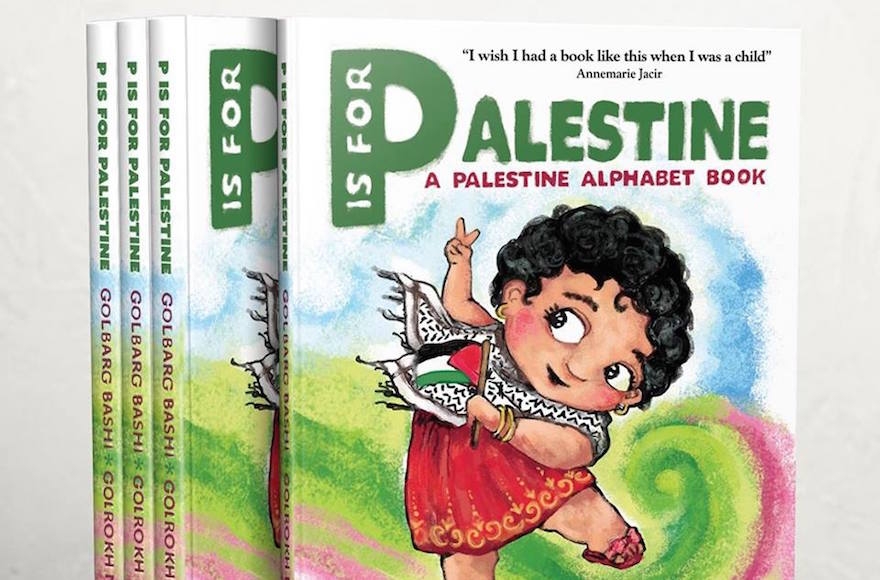Store that sells ‘P is for Palestine’ children’s book faces more heat — from the left
Published January 26, 2018

The cover of “P is For Palestine.” (Courtesy of Golbarg Bashi)
(JTA) — Book Culture, a chain of independent New York City bookstores, just can’t win.
First it promoted a children’s book about Palestine that praised intifada. That angered members of the Jewish community, so Book Culture apologized, condemned violence against Israelis and declared its support for Israel’s right to exist.
Now the apology has angered pro-Palestinian activists, who are pledging to boycott Book Culture unless it rescinds its statement and — wait for it — apologizes for the apology.
A petition calls for a boycott of both purchasing and selling coursebooks at Book Culture, whose flagship location serves nearby Columbia University. As of Friday morning, the petition has garnered the signatures of 18 Columbia faculty members and about 200 students, alumni and outside supporters. The faculty signatures include Joseph Massad, a leading scholar on Palestinian history, and Hamid Dabashi, the husband of the book’s author.
“We pledge to boycott the store until they comply with this demand and reaffirm their commitment, as a progressive independent bookstore, to representing and publicly supporting all marginalized voices in literature,” reads the petition, which was first reported on by the conservative website Campus Reform. “We support the efforts of Dr. Golbarg Bashi to bring attention to the Palestinian struggle for freedom, and for this reason we call on Book Culture to retract their statement and issue an apology.”
The book in question is “P for Palestine,” which dedicates pages to each letter of the alphabet, along with a corresponding word. The book’s most controversial two-page spread features the letter I, stating “I is for Intifada, Intifada is Arabic for rising up for what is right, if you are a kid or a grownup!” The accompanying illustration shows a father and child waving peace signs next to barbed wire.
The two Palestinian intifadas were violent uprisings against Israel in the late 1980s and early 2000s. Terror attacks, particularly during the second intifada, killed more than 1,000 Israelis, many of them civilians. The Israel Defense Forces killed thousands of Palestinians in clashes during that period. Many Palestinians view the intifadas as legitimate protest movements with violent and nonviolent elements.
Ensnaring themselves in controversy is — unsurprisingly — not what the Book Culture’s owners had in mind when they gave a donation to the book’s crowdfunding campaign. The book’s author, Bashi, is a friend of the owners, and had held Persian-language children’s book readings at Book Culture’s store near Columbia. When she asked the store to buy copies of the book, it agreed, kicked in $650 to its publishing costs and held a reading.
That irked the Stephen Wise Free Synagogue, a large Reform congregation whose rabbi, Ammiel Hirsch, is a leading pro-Israel voice in the movement. The synagogue threatened to cancel a book fair held with Book Culture unless the store apologized, which it did on Nov. 29.
“We regret that we did not fully appreciate the political or communal ramifications of the children’s book P is for Palestine by Dr. Golbarg Bashi, nor did we anticipate the pain and distress it has caused in our community,” read the store’s apology, which was published on the synagogue’s website. “We oppose terrorism or other forms of violence perpetrated against Israeli civilians during the intifada or thereafter.”
The statement put a local bookstore in the strange position of taking a public stance on an international conflict. But Chris Doeblin, Book Culture’s co-owner, doesn’t sound concerned about the boycott. He said he’s “not very worried,” and even though they are trying to hurt his business, praised the student organizers for finding their voice.
“I think it’s great to have passionate students who are interested in justice and standing up for their point of view and their equal rights,” Doeblin told JTA. “I hope that we grow more and more sensitive to everybody’s point of view. I hope we find ways to be as inclusive and supportive of the forces of justice and a better future as we can be.”
But Doeblin seems to have figured out just how impossible satisfying all sides of the Israeli-Palestinian debate can be. No, he is not going to issue another statement. And yes, he’s still going to sell Bashi’s book, which just completed its second printing.
“I’m not sure that I could compose one that would be useful to everybody involved, or even useful to some people, without being kind of unuseful in another way,” he said.
“There are two communities out there and both of them feel threatened. It’s reasonable, and what we have to do is continue to work toward a world where people aren’t threatened anymore. It’s not easy.”














